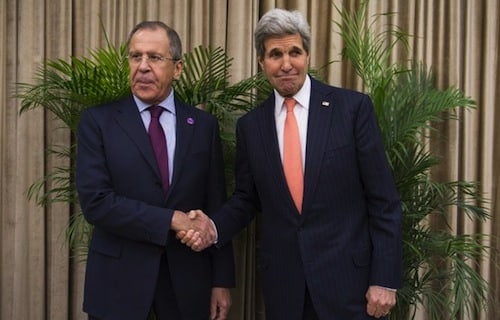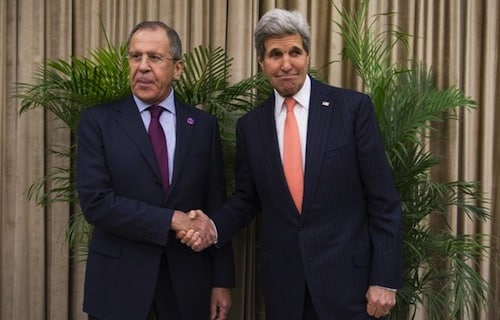
The Syrian refugee problem was maturing slowly steadily and would have provided the perfect pretext for a US-led ‘humanitarian intervention’ in that country. But Russia is there first and the best-laid American plan may have gone awry.
The US Middle East policies have been fixated obsessively on ‘regime change’ in Syria for at least a decade ever since the invasion of Iraq in 2003. (The original neocon agenda had envisaged regime changes in Iraq, Iran and Syria, but it got derailed as the killing fields in Iraq began dictating the geopolitics.)
It stands to reason that Russian intelligence has caught on to the US diabolical plot to create a fait accompli in Syria on the ground. Washington’s Faustian deal with Turkey and President Barack Obama’s authorization for air strikes in Syria (including against government forces), the haste with which Britain and Australia joined the US bombing mission on Syria, NATO statements, the behind-the-scenes undercutting by the US of Moscow’s robust efforts to kickstart an intra-Syrian peace process – the tell-tale signs on the politico-military plane were there aplenty.
But the clincher would have been the Russian intelligence input. In a rare public disclosure on Sunday during an interview with the state television – probably prearranged with deliberation – Russian Foreign Minister hinted at the hidden American agenda in Syria behind the so-called fight to “degrade and defeat” the Islamic State. Lavrov said,
Lavrov is a highly experienced and brilliant diplomat. Most certainly, he wouldn’t have made an off-the-cuff remark of this sort. To be sure, the proxy war in Syria has acquired a terrible beauty. Lavrov has politely told the US to back off from undercutting Russia’s decision to go for the jugular veins of the IS — or else, there will be mud on Obama’s face. In plain terms, Lavrov has signaled to Washington that Moscow knows about the American game plan to foster the IS as its cats paw to be eventually inserted into Russia’s underbelly in Central Asia and North Caucasus.
Of course, Russian intelligence must be aware that hundreds of fighters have travelled from Russia to join the IS. (Actually, Abu Omar Shishani, an ethnic Chechen, is a prominent IS commander.) Given this grim reality, Moscow has decided to draw a red line. It has concluded that the IS poses a significant menace to the Muslim-majority regions of Russia’s north Caucasus.
The seriousness with which Moscow has taken this looming threat to its national security is evident from the decision by President Vladimir Putin to visit the UN General Assembly in New York later this month to make a high-profile call for international cooperation to defeat the IS.
The parallel tracks – stepping up of military involvement in Syria on the ground and the opening up of a diplomatic track through the UN podium – aim at defeating the US attempt to repeat the cold war era strategy of pitting militant Islam against Russia by isolating Washington.
The Russian diplomacy through the recent past has aimed at developing extensive networking in the Muslim Middle East. The effort seems to be paying off. Interestingly, Lavrov all but disclosed during the TV interview in Moscow yesterday that the US regional allies in the Middle East themselves have developed misgivings about Washington’s real intentions vis-à-vis the IS. It is a stunning disclosure, indeed.
Equally, Lavrov lifted the veil a little bit to let the Americans know that the Russian military intelligence has not only been monitoring the operations of the American military aircraft in Iraq but have scientifically analyzed the US aircraft’s flight plans and so on. In sum, Russians seem to have intelligence dope to substantiate something that the Iranians have been all along maintaining, namely, that the American aircraft are regularly airdropping supplies for the IS.
To be sure, the assertive Russian military move on Syria has taken Washington by surprise. Short of putting American boots on the ground in Syria, Washington’s options to push back at the Russians are limited. Greece and Iran have conveyed to Russia that they will provide air clearance for Russian aircraft flying to Syria. (Washington had pulled strings in Athens to deny clearance for Russian aircraft.)
But the biggest setback for the US containment strategy against Russia in Syria is stemming from the dramatic change in the mood of the European countries that are beset with the Syrian refugee problem. The Schengen visa system, which has been the pride of the European Union and a symbol of European unity, has overnight packed up and border controls have reappeared across the region. (here and here).
The call by German Chancellor Angela Merkel that Europe and Russia must cooperate over Syria is a signpost of the shape of things to come. Quite obviously, Moscow must be sensing sees that the mood in Europe is becoming increasingly unfavorable for the Americans to push their containment strategy against Russia — not only over Syria but also Ukraine. (See my blog Ukraine tensions easing, but US won’t let go easily.)
The point is, the Europeans can’t be accepting it that they are being called upon by the US to handle the debris falling out of the covert US strategy to fuel a civil war to overthrow the established government of President Bashar Al-Assad in Syria. President Obama intends to prepare America to accept a token 10000 Syrian refugees next year, but it is not even a drop in the bucket, considering that 4 million people, one fifth Syria’s population, have fled the country since the war began in 2011.
This must be turning into the biggest foreign-policy disaster of the Obama presidency. The US is caught between the rock and a hard place. Russia is unlikely to budge despite the US displaying annoyance, since its core interests of national security are involved in the fight against the IS for which it needs the participation of the Syrian government forces.
On the other hand, US regional allies and the neocons at home are pressing Obama
“to do something,” while the European allies, on the contrary, have made it clear that they want an end to the conflict in Syria. The only option open to the US will be to dump the IS altogether and bury the project to manipulate militant Islamist groups as an instrument of its regional policies and to further its containment strategy against Russia. But then, it is not so easy to kill one’s own progenies.
Ambassador M. K. Bhadrakumar was a career diplomat in the Indian Foreign Service. His assignments included the Soviet Union, South Korea, Sri Lanka, Germany, Afghanistan, Pakistan, Uzbekistan, Kuwait and Turkey.
Reprinted with permission from Indian Punchline.

